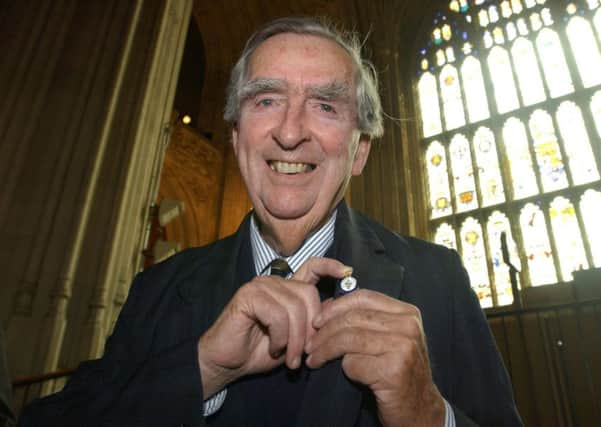Tributes paid to former Chancellor and Leeds MP Healey


The Labour peer served in Number 11 during the 1974-79 government and became the party’s deputy leader in 1980.
He was the MP for Leeds South East from 1952 to 1955 and then for Leeds East from 1955 to 1992.
Advertisement
Hide AdAdvertisement
Hide AdHe died peacefully at his home in Sussex this morning after a short illness.
Politicians from across the spectrum paid tribute to Lord Healey.
Labour leader Jeremy Corbyn said: “Denis Healey was a Labour giant whose record of service to party and country stands as his testament. All our thoughts are with his family.”
Shadow Foreign Secretary and Leeds Central MP Hilary Benn, whose father Tony unsuccessfully ran against Lord Healey for the party’s deputy leadership, said: “Very sorry to hear that Denis Healey has died. All our thoughts are with his family on their loss.
Advertisement
Hide AdAdvertisement
Hide AdChancellor George Osborne described his predecessor as a “giant of the Labour movement”.
Lord Healey was in Number 11 when the government was forced to go to the International Monetary Fund for a loan as the UK economy teetered on the brink of collapse in 1976.
Mr Osborne said Lord Healey had been in office “in the most difficult circumstances”.
Denis Healey spent long periods of his Chancellorship in the 1970s in a state of virtual war with large sections of the Labour Party.
Advertisement
Hide AdAdvertisement
Hide AdMany of his policies, including pay curbs and public spending cuts in times of financial rigour, were anathema to pure socialist thinking. There were occasions when he met with far more ferocity from the Labour rank-and-file than he ever suffered at the hands of the Conservative opposition.
One of his most celebrated confrontations was at the Labour Party conference in October 1976, when he had to roar to be heard above the shrieking and shouting left-wing protesters from the floor of the Winter Gardens, Blackpool.
Healey had flown up to Blackpool to make an impassioned demand to the party for loyalty in his defence of sterling. He won the day.
But his appearance at the rostrum sparked off some of the most astonishing scenes ever witnessed at a Labour conference. He was booed, hissed and mocked by his enemies.
Advertisement
Hide AdAdvertisement
Hide AdHe said: “I don’t come from the Treasury. I come from the battlefront.”
His rhetoric was like a red rag to a bull. But, aided by the microphone and robust vocal cords, he outshouted them. “I am going to negotiate with the International Monetary Fund on the basis of our existing policies, not changes in policies, and I need your support to do it.
“When I say existing policies, I mean things we don’t like as well as things we do. It means sticking to painful cuts in public expenditure that our Government has already decided on.”
This drew shouts of: “No! No!, No!”
Undeterred, Healey ploughed on: “It means sticking to a pay policy which enables us to continue the attack on inflation.”
This brought cries of: “Resign!”
Advertisement
Hide AdAdvertisement
Hide AdAnd he challenged them: “For how long do you think this Government would run? The strains, tensions, growing inflation and increases in unemployment would mean before many months a Tory Government.”
Only a few days before this conference drama, Healey had appealed to the IMF for a stand-by loan of £2.3 billion, forced on him prematurely by a collapse in sterling.
But Healey faced not only opposition from Labour’s excitable rank-and-file but also from senior figures on the party’s ruling National Executive Committee.
Barbara Castle, a former Social Services Secretary, had argued that it would be better to have a confrontation with the IMF than to have a political defeat.
His typically robust response to her was: “Don’t be daft!”
Advertisement
Hide AdAdvertisement
Hide AdAnd Healey was no less forthright with other recalcitrant Labour back-benchers, accusing them of playing the Tory game.
He told the Labour Women’s conference in Harrogate in 1977: “Some mothers do have ‘em - and I sometimes think we have more than most.”
He said it was not surprising that the Tories were engaged in an all-out effort to bring Labour down at any cost. “What is surprising and a little sad, is that some of our own MPs should be playing their game and voting with the Tories to defeat the Government.”
Healey had always been against the convention that Labour should “cosy up” to the trade unions, a convention that only really ended with the arrival of Tony Blair as Labour leader in 1994.
Advertisement
Hide AdAdvertisement
Hide AdBut he was equally forthright in his accusations that left-wingers were letting down trade unionists who, he said, had made personal sacrifices for the good of the country.
During one tempestuous speech in the Commons, at which he berated Labour rebels, left-wingers howled “Stalinist” at him.
But Healey was the sort of politician who gave the impression of relishing a political storm. He invariably scattered his critics and detractors in disarray.